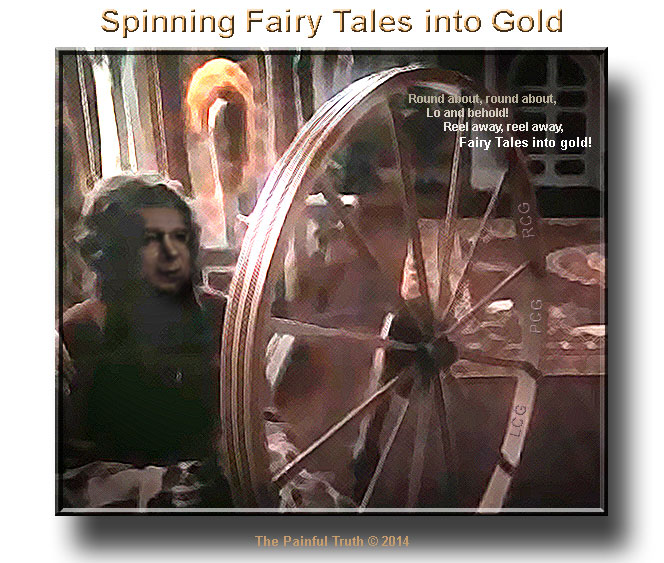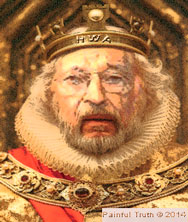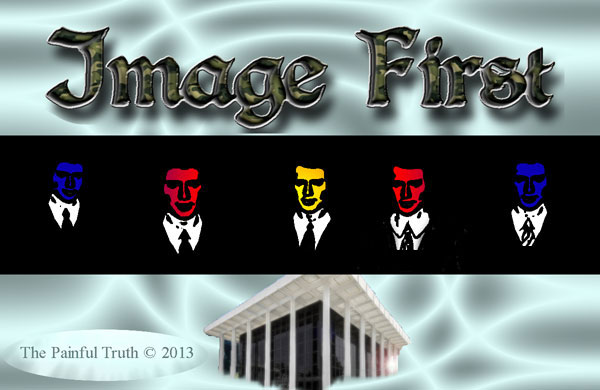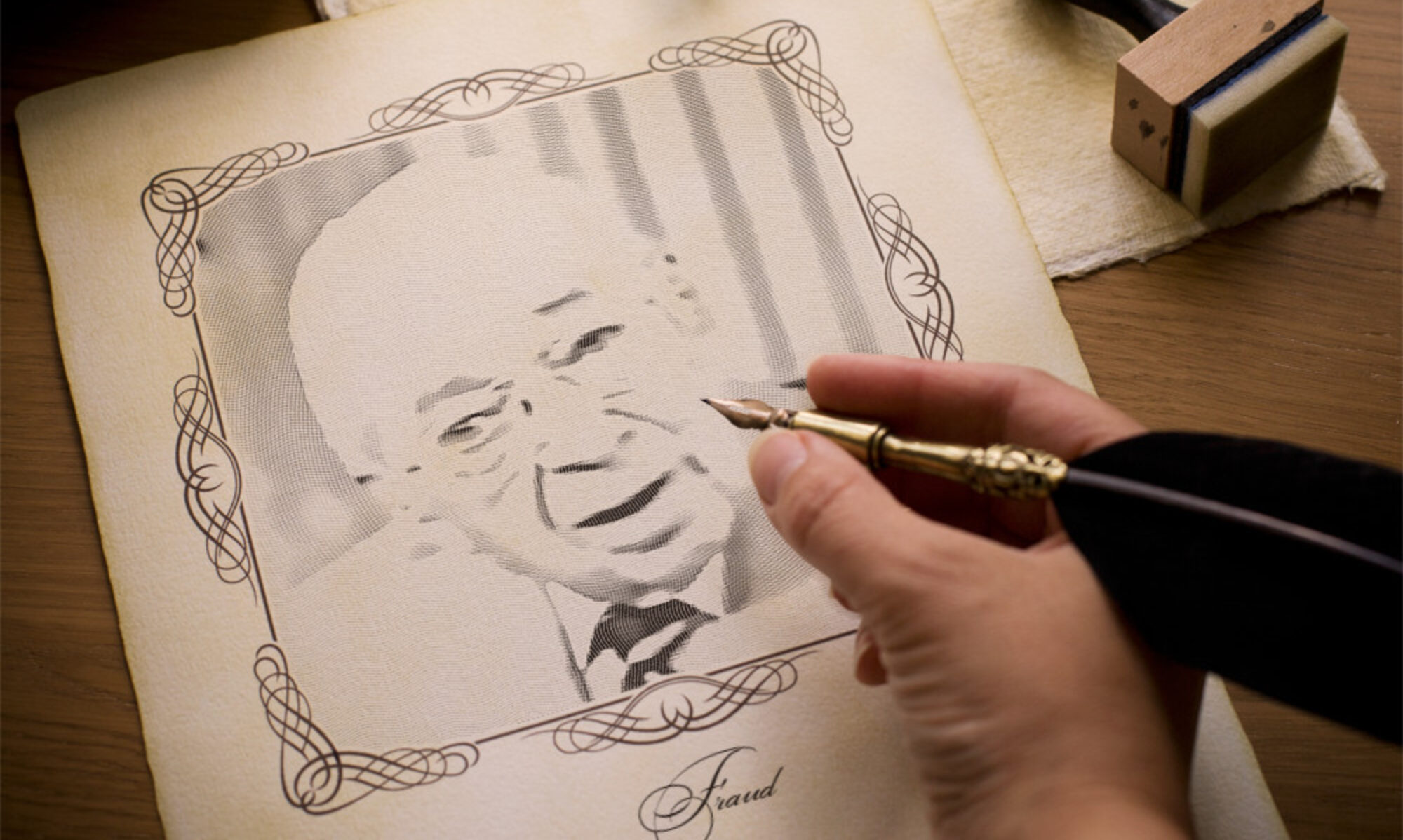There was an article (pg-3) in the latest Journal titled ‘United Pilgrim Crusade based on old WCG’. The author of this article wrote
The episode, titled “Charlatan,” starring Ed Asner, who plays newspaperman Lou Grant, deals with a fundamentalist Christian ministry based in Rosemead, Calif., noted for its beautifully landscaped campus and extensive expensive art collection, as well as a grand auditorium, among other things. I won’t overly delve into the plot but will point out interesting parallels that indicate where the episode’s writers may have gotten their inspiration: headlines in L.A.-area newspapers of the time.
Rumpelstiltskin. Part Two

Part Two.
King Herbert Marries.
After the king’s first wife died, he thought of himself and his beastly urges, saying to himself: ‘I am in need of a queen for my urges are many and my need are unfulfilled’. One day while walking among his sheep, the king spotted a women whom caused desire in his loins. And the king courted the women and the women the king, for he had riches and she had none. The future queen accompanied the king on many trips to different lands. One morning, the king found all that he had wished for came to pass. The king began to pave the way for the people to accept his impending marriage. He began relating how God allowed the first queen to die, because she could not have kept up such a grueling pace, could not have remained a companion and wife to him in this new phase of his kingship. He took the women half his age in marriage, and the pretty became the second queen who would sit with him at many banquets in other lands.
Wealth of a Nation.
 Over time the king and all the kingdoms leaders demanded supreme respect, because they had the most gold and silver. As long as their empirical selves and power base was not shaken, the king could do as he pleased. While the governors of the land did what they wanted and ripped off everyone, the king kept the people happy with wonderful scenarios of a coming world kingdom. Day after day he served up to the people a dose of mush, brainwashing the people into thinking that the land of milk and honey was soon to materialize.
Over time the king and all the kingdoms leaders demanded supreme respect, because they had the most gold and silver. As long as their empirical selves and power base was not shaken, the king could do as he pleased. While the governors of the land did what they wanted and ripped off everyone, the king kept the people happy with wonderful scenarios of a coming world kingdom. Day after day he served up to the people a dose of mush, brainwashing the people into thinking that the land of milk and honey was soon to materialize.
The king thought that the people would continue to fear him and that they would never break the laws of the land, and thus the civil and ruling authorities would be safe from any rebellion or coup and could continue their criminal activities against the people. It was the perfect setup. And for this, the governors were allowed any gold or silver that they could shake from the general masses of people in the name of God and king. Both the governors and the king lived happily together, as each needed the other. For the king had a legislative board to pass laws that suited his purpose and had those who were willing to crackdown and brutally enforce such legislation at the point of a sword. As wealth is an instrument of power, force is the instrument of policy.
Disenchantment in the Kingdom.
And it came to pass that many of the people became more and more disenchanted with the lifestyles of those who ruled over them. They came to see the hypocrisy of the king and that of his henchmen. The king could now no longer placate the mesmerized masses that formerly rocked together with arms raised and eyes closed in a hypnotic stupor within the court of the king! The lavish quarters of the king, expensive chariots, luxurious homes, costly clothes, and the finest cuisine caused the people to grumble. For the people lived in squalor and drove chariots that would lose their wheels, their clothes tattered and worn, and their food was of the lowest quality. The king had even forbidden the use of shamans when illness was to strike a family member, yet the king was exempt when he himself was afflicted.
Divorce and Scandal.
After some time, the king became increasingly disenchanted with his marriage. The mighty ruler had grown disgusted with his queen, and it was his belief there had been a plot to remove him from his kingship and place him into a mental institution. But what could he do to save face?
The king had wanted it to appear that the queen was committing a lawless offense so he could invoke the scripture of old which said: “If the unbeliever depart, let him (her) depart….” As king he could change the laws of the land on a whimper. And change the law he did! The king disallowed the women of the kingdom the one luxury that they had to hold onto their self esteem. The king outlawed the painting of faces! An old custom that the king made legal in order to please the queen before they married!
So it came to pass that the court of the law was to grant the king and his queen a decree of divorce. The queen had disclosed to the court that the king had boasted of an incestuous relationship with his daughter from the first queen. The court not wishing the king to suffer, forbade the telling of the incest to the people of the kingdom. But not all wished to protect the king, for there was found within the kingdom a governor who spoke truth. A man who had moral direction.
Image

Michael
Michael stood alone in the middle of the foyer of the Seattle Masonic Hall, people swirling around and past him without interacting with him, a solitary island in the midst of a sea of people. I noticed he was new and that apparently, no one was interested in getting to know him. It made me feel sad. I went over and introduced myself to him and began learning about him. Over the next few weeks and months, I had him over to dinner with my family several times and we even went and worked out together at the gym. I learned about this “good guy” and he had a lot of depth that most people would not expect.
Michael shared with me his story about how he entered into the Marines at the age of 30. It was a matter of honor that his mates referred to him as “the Old Man” because they respected the fact that he stayed in there with them even though they were mostly a decade younger than he. He wanted to be a Marine. His father was a Marine.
Before the Passover I had broken my toes and at the Passover Service it was Michael who was to wash my feet. He looked me in the eye and said, “I ain’t gonna mess with no broken toes,” whereupon he washed my one foot without the broken toes. I washed his feet.
It was during the Days of Unleavened Bread that he showed up in our apartment complex in the parking lot. My wife and I looked at each other in dismay at him on the heavy duty motorcycle he had ridden on. He was all excited about it. He was a sincere believer who was going to take his brother out in the woods and talk to him about his new faith. We didn’t say anything and hoped for the best.
It was shortly after this that we learned that he was on his way on his motorcycle to prepare to go out to the woods when he got clipped on his head with the mirror of a semi. It removed the top of his head and he ended up in a coma in the hospital. His face had not been affected so it looked like he was in a peaceful sleep.
Each day for nearly 40 days, I would go down to the hospital after work in the afternoon and would sit with him and talk to him because I had heard that those in a coma often heard those talking to him. I would describe the Spring afternoon and the sun shining. At the last, I was not able to get to the hospital and he had changed doctors. He died shortly afterward from the trauma. I believe it was about 40 days.
What I did not know is that Michael had shared our friendship with his family: His dad, mom, sisters and brothers. I was the only one from the church in to see him at the hospital. I had talked with his family when they were there and we got to know one another as best strangers could under such circumstances.
Because Michael was a Marine as was his father, he was given a funeral with full honors with Marines in dress uniforms giving the gun salute with rifles.
Afterward, I prepared an obituary for the Worldwide News. I learned that I had to give it to the minister. It was a paragraph and told part of his story of being in the Marine Corps.
It turns out that I gave it to Dennis Luker after services on the Sabbath. He told me that he had met the family and when they told him about me, he said to them, “Oh, he’s so quiet!”. This produced laughter from Michael’s family and they instantly knew that Dennis Luker knew neither Michael nor me. He was attempting to cash in on an opportunity by pretending to be someone and something he wasn’t and got caught at it.
Eventually, the obituary made it to the Worldwide News. It was a sentence long. It was a brief sentence at that. Michael _____ died…. That was about it. Name, no rank, no serial number. It was crisply impersonally efficient.
During my brief discussion with Dennis Luker, he did something odd: He stroked my stomach as if it were a bowling ball. It was weird and creepy. Very weird and creepy. Very very weird and creepy. I just stood there and allowed him to do it. After all, this was God’s Evangelist of the Worldwide Church of God — the very Work of God. Many of us had been conditioned to be subjected to authority without question — to accept what was truly unacceptable, because the Very God of the Universe would support them even if they were wrong.
I vaguely felt as if I had been raped.
The important thing here is for the alpha male Corporate Executive to assert his superior dominance over an underling to maintain Corporate Order and insure the proper image for the Corporate Executive in the hierarchy of the Corporate “monkey tree” where all the executives are striving to be “top banana”.
The Magic Lantern
Moral Mazes: The World of Corporate Managers by Robert Jackall covers the ground occupied by the Armstrongist Worldwide Church of God and their Church Corporate spinoffs — not specifically, but in practice, since all the participants follow the same thinking and practices of those in the Corporate 200. Chapter 7, The Magic Lantern, covers the aspects of image creation for the purposes of public relations:
The need for symbolic dexterity, particularly the ability to fashion, quickly and readily, appropriate legitimations for what must be done, intensifies as one ascends the corporate ladder. Since the success of large commercial bureaucracies depends to a great extent on the goodwill of the consuming public, ambitious managers recognize that great organizational premiums are placed on the ability to explain expedient action convincingly. Public opinion, of course, constitutes one of the only effective checks on the bureaucratic impulse to translate all moral issues into practical concerns. Managers not only face the highly specific and usually ideological standpoints of one or another “special-interest” group but, even more fearsome, the vague, ill-formed diffuse, highly volatile, and often irrational public opinion that is both the target of special-interest groups and the lifeblood of the news media. Those imbued with the bureaucratic ethos thus make every effort to mold public opinion to allow the continued uninterrupted operation of business. Moreover, since public opinion inevitably affects to some extent managers’ own conceptions of their work and of themselves, public goodwill, even that which managers themselves create, becomes an important part of managers’ own valued self-images. In this sense, both moral issues and social identities become issues of public relations.
Dennis Luker had been in the Corporate World before his induction into the Church Corporate and had obviously learned the lesson of being a triumph of image over substance. An examination of his Master’s Thesis yielded a window into this world, confined by the strictures of the lessons of being a Regional Pastor: It was not anything like the Master’s Thesis next to it on the shelf, Dr. C. Paul Meredith’s Satan’s Great Deception, which could be described as having intense spiritual content, but instead dealt with the purely physical aspects of deciding whether or not a visiting minister was to stay in the home of the Regional Pastor or at a motel nearby and making sure that the car was washed before sunset on Friday. People forget the mechanisms driving the engine of the Armstrongist Churches of God are the tactics of modern corporations, not the “Spirit led” assemblies of Christian ministers, disciples and apostles of the distant past: It’s business. Businesses are for the purpose of making a profit. To do this, the end justifies the means — the end being making profit, both in money and membership (used as a tool to sustain the ego of the narcissistic leader(s)).
This creates a new virtual world which is nowhere near the one the rank and file live in. Robert Jackall explains:
In fact, bureaucratic contexts typically bring together men and women who initially have little in common with each other except the impersonal frameworks of their organizations. Indeed, the enduring genius of the organization form is that it allows individuals to retain bewilderingly diverse private motives and meanings for action as long as they adhere publicly to agreed-upon rules. Even the personal relationships that men and women in bureaucracies do subsequently fashion together are, for the most part, governed by the explicit or implicit organizational rules, procedures, and protocol. As a result, bureaucratic work causes people to bracket, while at work, the moralities that they might hold outside the workplace or that they might adhere to privately and to follow instead of the prevailing morality of their organizations situation. As a former vice-president of a large firm says: “What is right in the corporation is not what is right in a man’s home or in his church. What is right in the corporation is what they guy above you wants from you. That’s what morality is in the corporation.”
This explains well why Roderick Meredith and Dennis Luker tolerated the behavior of Garner Ted Armstrong without saying one word or leaving: They were loyal to the corporation and their morality revolved around what Herbert Armstrong wanted from them. A good part of that was the image making part of the coverups to insure that the Corporation continued and prospered. In this world, what mattered was not the good of the members, but the good of those in the “middle management” and above, specified by rank. Dennis Luker would favor those in congregations who were wealthy — especially those were millionaires. His own children, in fact, married the children of a millionaire in his congregation. He could be close “friends” who could further his agenda, pursuing his career in the Armstrongist Churches of God along with the salary and the hoped for retirement it would bring. In fact, many have commented about his sermons over the years filled with his concerns about this very topic. Many times, those who were “different” or “lowly” may not have had such favor in his eyes, but he was able to maintain a calm demeanor which belied his true feelings, making it seem that he was personable and a concerned pastor.
Moral Mazes includes a comments from executives relevant to truth:
Everyone out there is constructing reality. We and our clients have perceptions too. Who is telling the truth? Is there anyone out there who has the time and inclination to sit down and truly evaluate the many situations.
That’s a good question, especially considering “The Present Truth” of many of the leaders of the Cult of Herbert Armstrong.
Truth? What is truth? I don’t know anyone in this business who talks about the “truth”.
That’s actually true: Perceptions are transformed so people believe they have the truth. Anyone who has seen the many “prognostications” of Herbert Armstrong and others should eventually come to the conclusion that they don’t have anything even close to what we could call “truth”. There is no reason to trust such people. They have proved their lack of integrity.
It should be noted that the chapter after The Magic Lantern is Invitations to Jeopardy.
In the end, we should all observe the aphorism of G’Kar in Babylon 5: “Let me pass on to you the one thing I’ve learned about this place. No one here is exactly what he appears.”
In fact, in the world of the Cult of Herbert Armstrong, nothing is exactly as it appears, including the smarmy image of those who portray a deeply caring persona.
Anyway, those who are wise will make it quite irrelevant by leaving the entirely dysfunctional environment where there is no real benefit to sacrifice resources and sanity to the Corporate Executive image makers conducting little more than a PR campaign for ego and money: It’s not worth it.
For those of you in the process of leaving the Cult of Herbert Armstrong, a piece of advice: Set boundaries.
